Google Search and Maps now include missing children AMBER alerts
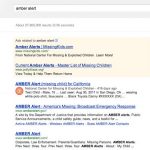
AMBER alerts are the emergency bulletins that announce when a child has been abducted, they sometimes interrupt radio and television broadcasts or flash across variable message signs (aka matrix signs) on the highway. Today, Google announced it has teamed up with the National Center for Missing and Exploited Children to bring location-based AMBER alerts to Google Search and Maps, both mobile and desktop.
These AMBER Alerts provide information about the abducted child, and any other details about the case and the alleged abductor, including name, identifying traits, and make and model of car. The feature was actually suggested to Google by a user in the Google search forum in early 2011, but it is unclear if the user's suggestion was the origin of this development.
Google improves searches in News
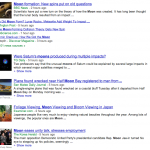
Google News is one of the search giant’s more contentious services (Brazil's National Association of Newspapers recently blocked it from using its members' content because the service allegedly drives traffic away from their websites), but there’s no question it’s an incredibly useful resource, pulling content from a wide variety of sources.
Last year Google made it easier to scan for stories, and this year it’s implementing some useful changes to the News search results pages.
Your search results may vary -- why I switched from Google
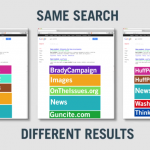
Search engine DuckDuckGo released a video a few days ago that shows how Google personalizes results for all signed in and signed out users. It asked 131 people to search for the same Election related topics ("abortion", "gun control", and "Obama") on Google at the same time, and most of them received slightly different results.
That Google personalizes results in this way is hardly new information. The company has been doing it since 2009 and Eli Pariser covered the topic in depth in his 2011 book, The Filter Bubble (a great read). He also gave an enlightening Ted Talk on the subject in which he observes that "the Internet is showing us what it thinks we want to see, but not necessarily what we need to see."
Need to find files or folders nearly instantly? Try UltraSearch 1.7

AM Software has released UltraSearch 1.7, a major update of its super-speedy MFT search tool.
As with many similar tools, the program doesn’t waste resources maintaining an index on your hard drive. Instead it accesses the NTFS Master File Table directly, which allows UltraSearch to retrieve its results at very high speed, typically just a second or two.
'Google in a box' version 7 improves enterprise search

Today, Google updated its enterprise search product, upping the number of supported languages to 60, better improving Big Data capabilities, increasing scalability and providing document previews with search results.
"Administrators can easily add content sources from secure storage, cloud services or the public web and social networking sites", Matthew Eichner, general manager of Google enterprise search, says. "GSA 7.0 also provides Google-quality search for SharePoint 2010, making for a more simple and intuitive, all-in-one search experience".
Happy Birthday Google (belated)

If you went to Google.com today, you probably noticed the logo was replaced with a fun little birthday cake animation celebrating 14 years of incorporation. Google was incorporated on Sept. 4th 1998, but chose today to celebrate the birthday. What does it matter when they celebrate, after all, Google has had a great year.
In April, Google released a concept video about Project Glass, fancy glasses with computers in them. In May, the search giant closed the purchase of Motorola Mobility. During the annual developer conference in June, Google made a lot of announcements, among them: Android 4.1, Nexus 7 tablet, Nexus Q and creepy but useful Google Now. The fun: skydiving, bicycles and rappelling down the side of a building. Big surprise: event participants could purchase a developer version of Google Glasses.
Google gets a break in the US, a warning in Europe

Trustbusters and other regulators still have their eyes on Google, which in response has maintained high lobbying presence in Washington. Is that effort paying off?
This week is surprisingly chock full of happenings -- good or bad, you be the judge -- for Google in the areas of lobbying and antitrust. Governments changed their positions on antitrust, rivals combined efforts and Google shifted strategy. All-in-all, it must be busy at the Washington, DC offices.
'Bing It On' is a real turn-off

Microsoft's "Bing It On" marketing campaign is brilliantly conceived, but don't believe the results. The search comparisons leave out the most important piece of information: Location. Another: relationship. In my blind testing Google and Microsoft searches using Bing It On, the comparison is blind at worst, near-sighted at best.
Bing It On is something like the Coke-Pepsi taste tests from the 1970s. People try both without knowing which is which and say which they like better. Here they blind test Bing and Google, with results presented side-by-side, left and right. But because the tests are anonymous, identity and location are missing elements, or they are for me. Also, both services now offer social graph search, which also is missing when tabulating the comparison. But wait! What about news or image searches, which I often do? Blogs and other sources? It's this richness the comparison lacks, so the taste is bland not sweet. As such, I find the comparison to be fundamentally flawed.
The quest for the best search engine: Bing It On
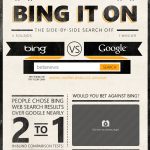
If you had to name your favorite three search engines, which would they be? It is almost certain that Google would make the list, and that some Internet users may have trouble naming more than one or two as they rely solely on a single search engine for all of their searches.
Bing may be on that list, although it is less likely that people from outside the United States will name the search engine, as its localized results are not really on pair with its English results. Tech savvy users may name DuckDuckGo or Ixquick, two niche search engines that promise better privacy and unfiltered results that do not put users into a filter bubble. Regional search engines, Chinese Baidu for instance, may also be added to the list by people from those regions.
Virtualizing Nationality, and how GeoEdge suckered me into clicking

Utilizing a network of proxy servers in more than 75 countries across the globe, Rhode Island-based company GeoEdge lets SEO and SEM managers, publishers and advertisers check how their sites and advertisements appear and perform in countries other than their own. The company gives its customers the ability to analyze Web pages from multiple locations simultaneously and track the efficacy of different advertisements, giving them the data they need to create business intelligence about their advertisements.
GeoEdge Analytics captures any ad displayed on any website, everywhere in the world. With it, publishers can enforce compliance rules in other countries, and ad networks and buyers can analyze and identify international media opportunities.
Click fraudster eliminates bots, sends advertisers bogus bills

While click fraud and identity theft are probably the most common forms of larceny on the Internet, I just heard of a company that sets a whole new standard of bad, lying to advertisers about, well, everything.
Click fraud is when a website either clicks on its own ads to increase revenue, gets someone else to click on them with no intention of buying or works with botnets to generate millions of illegal clicks. I wrote a few months ago how longtime YouTubers were suffering income drops as Google algorithmically eliminated their botnet clicks. But click fraud requires a third-party ad network to work. What I am writing about here is something completely different.
Google wants a slice of Apple’s pie, starts punishing pirate sites

It had to happen eventually. Representatives of the media and entertainment industries have been complaining for years about Google linking to sites that offer copyrighted content, accusing the Internet giant of not doing nearly enough to prevent access to infringing material. The company’s stock response has always been that it only indexes the web, and the results that appear when someone types a query into Google simply reflects the sites that people go to, and other sites link to. It’s a fair argument, although one somewhat undermined by last year’s algorithm update that targeted content farms, and showed the company’s willingness to tweak what sites appear where in its index.
Google does of course remove pages when it receives copyright removal notices to do so. In fact, in an effort to demonstrate just how actively, Google recently expanded its Transparency Report to show how many URLs it removes, from where, and at whose request. The figures are staggering. In the last month alone, Google removed over 4.3 million URLs from its index.
Potential game changer: Real-time commerce engine Ginjex launches in beta

London-based startup Ginjex launched its "real-time availability engine" in Beta on Wednesday, providing small and independent businesses a place to list their availability live so customers can get the services they need exactly when they need them.
Bringing goods from website to consumer has become a mind-bending race to see who can get there the fastest. Zappos set a standard for speed with its common next-day delivery upgrades, and Amazon Prime offers subscribers next- and second day shipments on all purchases for just a couple of dollars, where just a few years ago, such rapid delivery used to tack on a significant extra cost.
Pay-per-click ads are taking over Google search results [infographic]
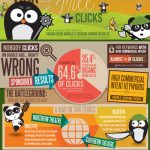
If you use Google search (and who doesn’t), you may have noticed that sponsored results (pay-per-click, or PPC, ads) have been taking over more and more of the search engine results page.
Here at WordStream, we’ve noticed that too! So we decided to do some research into what impact all of these new, bigger, more prominent and engaging ad formats are having on the average Google searcher. The results are astonishing: Clicks on paid search listings beat out organic clicks by nearly a 2:1 margin for keywords with high commercial intent in the US.
Marissa Mayer might achieve greater things in her career, just not at Yahoo

If Aaron Sorkin (The Social Network, The West Wing, Newsroom) wrote the story of Yahoo and he got to Marissa Mayer’s surprise entrance as Yahoo’s latest CEO, here’s how he would probably play it: the brilliant, tough, beautiful, charismatic engineer defies her Google glass ceiling and, through sheer vision and clever example, saves the pioneering Internet company. That’s how Sorkin would play it because he likes an underdog, loves smart, well-spoken people and revels in beautiful if slightly flawed characters and happy endings. But in this case Aaron Sorkin would be playing it wrong.
To be clear, were I in the position of Yahoo’s board I would probably have hired Marissa Mayer, too. On paper she’s nearly perfect (only CEO experience is missing) and the drama of her going from not even being on the list of candidates discussed to getting the big job is wonderful theater that will play well on Wall Street for weeks, maybe months. For once the Yahoo board seems to have been on the ball.
Recent Headlines
Most Commented Stories
BetaNews, your source for breaking tech news, reviews, and in-depth reporting since 1998.
© 1998-2025 BetaNews, Inc. All Rights Reserved. About Us - Privacy Policy - Cookie Policy - Sitemap.